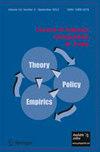基于云存储的双边市场动态平台竞争
IF 0.6
Q4 BUSINESS
引用次数: 1
摘要
随着时间的推移,双边市场的平台提供商通过推出新一代平台来竞争。新一代产品通常通过某种形式的云存储进行向后兼容,这样消费者上一代产品的内容、偏好、应用程序、软件和游戏仍然可以在当前这一代产品上使用。当平台提供商长期竞争时,切换平台的消费者无法使用他们以前的内容。有了双向性,现有的平台提供商能够利用其对市场另一端的价格,即对内容提供商的价格,内生地决定消费者在考虑切换平台时面临的消费者结转效用的强度。因此,云存储的双面性导致了内生决定的转换成本。我发现云存储并不是用来阻止平台进入,而是用来缓和平台提供商之间的竞争。此外,由此产生的平衡与一些传闻证据相一致,这些证据表明,智能手机、视频游戏机、个人电脑、电子阅读器和在线流媒体订阅等多个平台行业都试图进入市场。本文章由计算机程序翻译,如有差异,请以英文原文为准。
Dynamic Platform Competition in Two-Sided Markets with Cloud Storage
Platform providers in two-sided markets compete over time by introducing new generations of their platforms. New generations are often backward compatible through some form of cloud storage so that consumers' content, preferences, apps, software, and games from the previous generation can still be used on the current generation. When platform providers compete over time, consumers that switch platforms are unable to use their previous content. With two-sidedness, the incumbent platform provider is able to use its price to the other side of the market, the price to content providers, to endogenously determine the strength of the consumer carryover utility that its consumers face when considering switching platforms. Thus, two-sidedness with cloud storage results in endogenously determined switching costs. I find that cloud storage is not used to foreclose platform entry but instead is used to soften competition between platform providers. Furthermore, the resulting equilibria comport with anecdotal evidence of attempted entry across several platform industries, such as smartphones, video game consoles, personal computers, eReaders, and online streaming subscriptions.
求助全文
通过发布文献求助,成功后即可免费获取论文全文。
去求助
来源期刊

Journal of Industry Competition & Trade
BUSINESS-
CiteScore
3.10
自引率
5.30%
发文量
15
期刊介绍:
The Journal of Industry, Competition and Trade (JICT) publishes research on the microeconomic foundations of industrial strategy, innovation, competition, and trade policy, concentrating on the functioning of markets for goods and services. The journal’s primary aim is to bridge the gaps between economic theory, empirical analysis and economic policy, and to provide a forum for applied theoretical research on policy questions. Journal of Industry, Competition and Trade promotes the combination of theories with facts, and encourages the incorporation of facts into model building. focuses on using applied theoretical research to arrive at policy conclusions, and encourages researchers to investigate policy questions. For example, game theoretical models that analyse the sources of and obstacles to innovation, the functioning of markets or strategic interactions are combined with empirical facts; and supporting empirical analysis is provided for models that explain how institutions, consumers and firms interact, how they shape their environment, and how incentives influence behaviour. Papers that analyse institutions and policy measures are expected to make explicit reference to theoretical models, while theoretical work is expected to include the analysis of empirical implications. The journal serves as a forum for dialogue between economists from academia and (national or international) policy circles. The composition of the Editorial Board, which includes academics as well as leading economists working at governmental and international organizations, facilitates exchanges between academia and economic policy. Officially cited as: J Ind Compet Trade
 求助内容:
求助内容: 应助结果提醒方式:
应助结果提醒方式:


